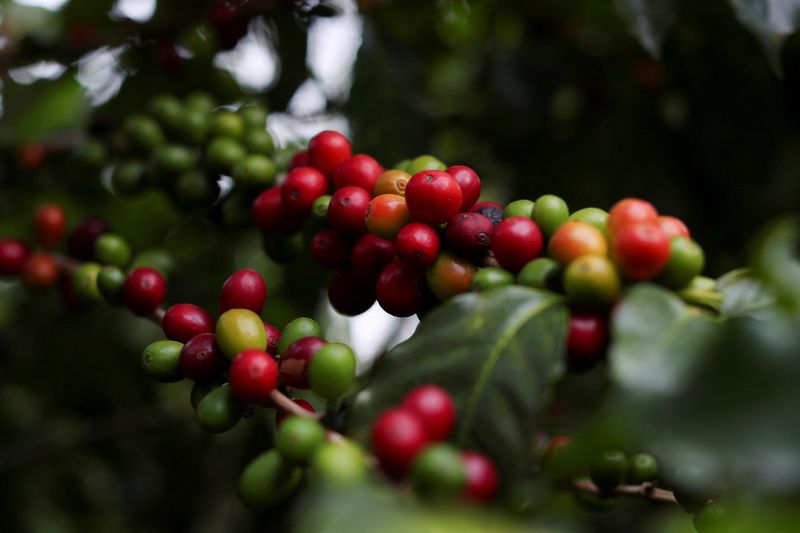Exclusive-Brazil coffee defaults spike for second year in a row
2022.11.01 07:54
[ad_1]

© Reuters. FILE PHOTO: Coffee berries are seen on a tree at the Biological Institute plantation in Sao Paulo, Brazil May 8, 2021. Picture taken May 8, 2021. REUTERS/Amanda Perobelli
By Maytaal Angel and Marcelo Teixeira
LONDON/NEW YORK (Reuters) – Brazilian coffee farmers are defaulting on contracts for a second straight year, according to traders and lawyers representing the industry, failing to deliver on pre-agreed sales and exposing trade houses to losses.
The defaults, though less widespread than last year, have scrambled the coffee market, leaving traders reluctant to agree to forward sales for next year’s crop or the one after.
Defaults started to pick up last year after a series of price shocks caused by severe frosts that ruined the harvest.
This year’s harvest was smaller than expected. Some analysts cut their initial estimates by nearly 4 million bags as trees have taken longer to recover from 2021’s frosts and drought. Coffee prices in August and September traded between $2.17 and $2.21 per pound, over 70% higher than two years ago.
The surge in prices gave Brazilian farmers an opening to default on contracts so they could sell beans on the spot market, earning a higher price that outweighs any liability for a default.
Several major exporters such as Sucafina, Olam, Louis Dreyfus and COFCO, as well as co-ops including No. 1 exporter Cooxupe, are legally battling farmers for compensation over contract defaults, according to court documents seen by Reuters.
Sucafina, Olam, Dreyfus and COFCO did not respond to requests for comment. Cooxupe declined to comment.
“We’ve been told to have less exposure with (Brazilian farmers). It’s going to be one or two years until traders forget” and start buying forward again, said a trader at a large international commodities trading company, asking not to be named.
WIDER IMPACT OF DEFAULTS
Forward selling by farmers and exporters from top exporter Brazil is an important feature of the market. Advance sales help reduce market fluctuations because they allow farmers to sell throughout the year, not just during harvest.
Lawyer Cristiano Zauli from Cristiano Zauli Advogados law firm, who assists traders in cases against Brazilian farmers, said he had filed around 50 lawsuits this year against about 100 last year, seeking compensation from coffee producers who have failed to deliver.
He said he had obtained court orders to seize coffee at farms, similar to last year when harsh frosts damaged around 15% of Brazil’s coffee crop and pushed prices to multi-year highs.
Traders said this year’s wave of defaults caused the ICE (NYSE:) futures price to spike in late September ahead of the front month contract expiry, and could do so again ahead of the December contract expiry on Dec. 19.
Traders who buy coffee a year or two in advance usually hedge purchases by taking short futures positions. When futures rise, they take a loss on that position, but can offset it with a similar rally in physical coffee prices.
However, when farmers default, traders do not have the physical coffee to sell to offset the futures market. Instead, traders cover short positions by buying more futures, magnifying wild swings in the market.
That’s what happened in September, when Arabica coffee futures rose from around 2.16 cents per pound to 2.32 cents late in the month, a 7% increase.
A lawyer working for one of the five largest coffee exporters in Brazil said the defaults concerned less than 10% of Brazil’s total forward contracts. That would still be a significant amount since Brazil produces about 35% of the world’s coffee.
[ad_2]
Source link








